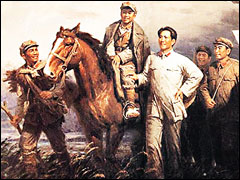Source: CRI
09-04-2006 17:15

In the summer of 1931, with the approval of the Central Committee, Deng Xiaoping went to the Central revolutionary Base Area in southern Jiangxi and western Fujian, Fierce fighting was still going on there, as the Red Army was trying on smash Chiang Kai-shek's third "encirclement and suppression" campaign.
Before long Deng assumed the post of Party Committee Secretary of Ruijin County, which was adjacent to the Central Revolutionary Base Area. The first thing he did was to rehabilitate the cadres and ordinary people who had previously been wronged and called a Soviet congress to discuss the work of the county, thus arousing the people's enthusiasm and vastly improving the situation. In the winter of 1932 he was appointed Secretary of the Party Committee of Huichang, a key county, and began directing the work in the three countries of Huichang, Xunwu and Anyuan. Six months later he was transferred to the Jiangxi Provincial Party Committee as Director of its Propaganda Department.
Just at this point, the provisional central leadership, which had been following the line of "Left" adventuresome, moved its headquarters from Shanghai to the Central Revolutionary Base Area. Deng Xiaoping, Mao Zetan, Xie Weijun and Gu Bo, following the correct line represented by Ma Zedong, had all along been acting in accordance with the actual circumstances. They opposed the theory of "making cities the centre of the Chinese revolution" and advocated building strength in the vast rural areas, where the enemy's forces were relatively weak. They rejected military adventuresome in favor of luring the enemy in deep. They were against expanding the Red Army's main forces at the expense of local armed forces and urged that both be expanded simultaneously. They opposed the "Left" land-distribution policy which would have left former middle and rich peasants destitute. In view of these disagreements, the provisional central leadership waged a struggle against them. Deng was removed from the post of Director of the Propaganda Department of the Jiangxi Provincial Party Committee and given the most serious warning. Soon he was sent to the nancun District Party Committee in outlying Le'an County to work as an ordinary inspector.
However, Wang Jiaxiang, Director of the General Political Department of the Red Army, and Luo Ronghuan, Director of the Organization Division, knew Deng Xiaoping well. They sent him to the General Political Department to serve as its secretary-general. Soon afterwards he was assigned to work in the Propaganda Division of the Department, where he was made editor-in-chief of the official organ Red Star. This journal, which offered both news and articles on a variety of subjects, never ceased publication throughout the war years. It was hailed as the "Red Army's instructor on Party work"
In October 1934, because of the failure of the fifth campaign against "encirclement and suppression", the Central Red Army was forced to begin the Long March. Deng Xiaoping took the post of chief secretary of the Central Committee for the second tine and attended the Zunyi Meeting, and event that marked a turning point in the history of the Party. After the First and the Fourth Front Armies of the Red Army joined forces, he became Chief of the Propaganda Division of the First Army Group's Political department. After arriving in northern Shaanxi, he took part in the Red Army's Eastern Expedition to neighbouring Shanxi Province. After the conclusion of the expedition he became Deputy and then Director of the War of Resistance Against Japanese Aggression.
Editor:Wang Ping
